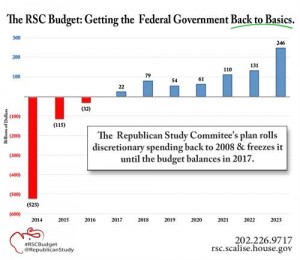
It should not be.
The Republican Study Committee “Back to Basics” budget ends the “fiscal cliff” tax increase, sets Medicaid spending on a flat track for ten years through providing block grants to the states for distribution, and as the Ryan budget does, protects Medicare from insolvency, as well as zeroing out Obamacare spending.
Bill Wilson, president of Americans for Limited Government notes that, “The Republican Study Committee’s “Back to Basics” Budget rolls back the massive growth of government since Nancy Pelosi and Harry Reid took over Congress in 2007 and puts us on a sustainable path for the future. The current spending levels have created an unprecedented debt crisis in America that threatens our very future as a sovereign nation. Our national debt is now larger than our entire economy, and the gap growing increasingly wider.”
In fact, analysis of the federal budget over the past three years shows that the United States’ debt has grown by an average rate of 10 percent each year while the economy has only grown nominally by 3.8 percent. A pattern that Wilson calls, “…an unsustainable debt spiral.”
Last year alone, the U.S. Treasury reported that gross interest payments on the debt consumed $350 billion, or more than one-eighth of the total revenues collected by the government. One reason analysts like Wilson demand aggressive and immediate action is the fact that these interest payments were actually suppressed due to our nation enjoying historically low interest rates.
A simple uptick of one percent on the interest paid on the overall national debt of $16.8 trillion would increase the current $350 billion to more than half a trillion dollars. In fact, even with the aggressive four year to balance Republican Study Committee Back to Basics budget plan were to become law, net interest payments on the national debt are projected to rise to $530 billion in the next ten years largely due to the normalization of interest rates. This rise occurs in spite of the budget being in a net surplus over that period.
The Congressional Budget Office estimates that if our nation stays on its current course, net interest on the debt will accelerate to consuming $857 billion in ten years.
With debt cost projections like this, it doesn’t take much imagination to see how interest on the national debt can very rapidly consume every tax dollar the government collects if our elected leaders don’t take quick and decisive action to bring spending under control.
Wilson makes this point emphatically saying, “It is inevitable that interest payments on this massive debt will rise, and an increasing percentage of the taxes Americans pay will be spent on paying off bankers and foreign governments who will hold us hostage. As a result, it will be all the more difficult in the future to bring our budget under control.”
Rather than consign future generations to being debt slaves to foreign powers around the world and the banks that enable them, every member of Congress who cares about our children’s economic future should not just support, but argue insistently in favor of the ‘Back to Basics’ budget.
While the U.S. House of Representatives will take up the ‘Back to Basics’ budget and likely pass a more modest alternative by Budget Chairman Paul Ryan which gets to balance in ten years, both of these approaches stand in sharp contrast with the just released Senate Democrat Budget Committee. The Senate Democrat budget never balances the budget, increases the national debt by trillions and calls for another 60 percent growth in government, while imposing more than a trillion dollars in additional taxes on the American people.
After four years of failing to produce a budget, the Senate Democrat proposal was called by Senate Ranking Member Jeff Sessions, “…a colossal failure to meet the challenge of our time. The budget continues the nation’s high gross debt-to-GDP ratio that is destroying jobs and wages today.”
Wilson concurs saying, “Senate Democrats have laid out a blueprint that, if enacted, would drown our nation in a sea of spending, taxes and red ink. It is a tour d’ force in the view of the left that growing government is not only desirable, but should be forced even when it is obviously destructive to our nation’s economic survival.”
Never before has the debate in Washington, D.C. been as clear. The choice of whether to continue to grow government under the notion that America is too big to fail, or pull our nation away from a debt cliff that history has proven always ends in economic disaster for the nation that goes over it with catastrophic consequences for the people.
Rick Manning is the Vice President of Communications & Public Policy at Americans for Limited Government. You can follow Rick on Twitter at @RManning957.






